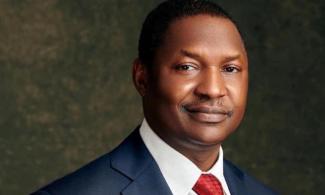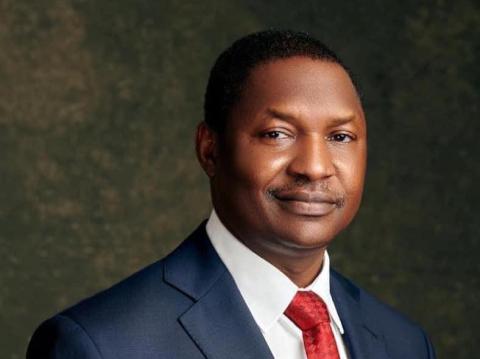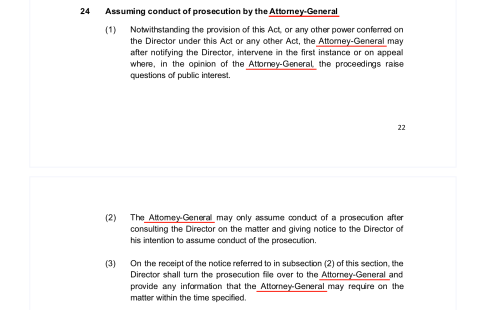
SaharaReporters gathered that the move by Malami is to stall the prosecution of high-profile corruption and criminal cases in order to protect his allies from facing justice.
Nigeria's Attorney-General of the Federation (AGF) and Minister of Justice, Abubakar Malami, is currently sponsoring a bill before the National Assembly to take over prosecuting and investigative powers of all the law enforcement agencies in the country.
SaharaReporters gathered that the move by Malami is to stall the prosecution of high-profile corruption and criminal cases in order to protect his allies from facing justice.

The bill tagged “The Prosecution Of Offences in Nigeria Act, 2017” if passed into law by the National Assembly will allow the office of the AGF to take over the conduct or discontinue criminal proceedings.
“Responsibilities to institute or take over the conduct of proceedings. Procedural requirements for taking over of criminal proceedings,” Part V of the bill seen by SaharaReporters read.
“Procedural requirements for discontinuance of proceedings. Discontinuance of proceedings after accused has been sent for trial.
“Assuming Conduct of prosecution by the Attorney-General. Review of prosecution powers of law enforcement agencies etc. Review of investigations conducted by law enforcement agencies.
“Power to conduct investigation. Power under the Extradition Act. Conduct of criminal proceedings by persons other than a Prosecuting Officer.”
Part V Section 20(1)(a)(b) further stated in part, “Subject to the exercise of the powers of the Attorney–General for public prosecutions under the Constitution and the provisions of other applicable laws, rules or regulations and notwithstanding the provisions of Part II of the Administration of Criminal Justice Act, 2015 on the control of criminal proceedings, the Prosecution Authority, under the directions of the Director shall, with effect from the date of commencement of this Act, be responsible for – conducting criminal proceeding against any accused person before any court in Nigeria in respect of any offence created by or under any Act of the National Assembly; taking over the conduct of criminal proceedings, instituted by any law enforcement agency, including the Police.”

Part V Section 24 is titled ‘Assuming conduct of prosecution by the Attorney-General’.
The section says, “Notwithstanding the provision of this Act, or any other power conferred on the Director under this Act or any other Act, the Attorney-General may after notifying the Director, intervene in the first instance or on appeal where, in the opinion of the Attorney-General, the proceedings raise questions of public interest.
“The Attorney-General may only assume conduct of a prosecution after consulting the Director on the matter and giving notice to the Director of his intention to assume conduct of the prosecution.
“On the receipt of the notice referred to in subsection (2) of this section, the Director shall turn the prosecution file over to the Attorney-General and provide any information that the Attorney-General may require on the matter within the time specified.”

SaharaReporters gathered that the bill is expected to be presented to heads of law enforcement agencies tomorrow (Tuesday, August 31, 2021) at a meeting convened by the Administration of Criminal Justice Act (ACJA) Monitoring Committee Secretary, Sulayman Dawudu.
They are to be blackmailed, intimidated and forced to endorse the ‘satanic’ bill secretly sponsored by the AGF, a source told SaharaReporters.
“Malami to re-enact the surreptitious takeover of the prosecution of corruption cases in the country and return it to ground zero,” the source added.
“The publicly criticised bill on creation of public prosecution authority, prepared in 2017 has resurfaced within the government by the Ministry of Justice through its ACJA monitoring Committee, Secretary, Sulayman Dawudu.
“This bill purporting to take over all prosecuting and investigative powers of all the law enforcement agencies in the country is to be presented to the law enforcement agencies tomorrow Tuesday, August 31, 2021 at a meeting convened by the ACJA monitoring committee to blackmail and intimidate leaderships of the law enforcement into endorsement.
“The bill is in all intent, purposes and activities in contravention of international standards in the fight against corruption; it leaves the fight against corruption in the control and manipulation of a political appointee in the person of Attorney General; it creates another agencies with investigation and prosecution over and above trained law enforcement agencies; it conflicts with the laws establishing all the law enforcement agencies; and will frustrate and demoralise the law enforcement agencies.
“The Attorney General who had bared his fangs recently with the withdrawal of his political associates like Danjuma Goge and others will have the express power to kill cases where he has interests.”
DOCUMENT: Prosecution of Offences in Nigeria Gom[2] by Sahara Reporters on Scribd
Implications Of Having The ‘Satanic’ Bill Passed
Identifying some of the implications of having the bill passed into law, an expert in legal matters noted that the “bill essentially kills the independence of the ACAs (Anti-Corruption Agencies), whereby they will be subservient to other authorities in the course of their investigation and or prosecution”.
The expert further noted, “The track records on investigation and prosecution of the office of the HAGF (Honourable Attorney General of the Federation) are nothing to write home about in comparison to the stellar prosecutorial outcomes of the Anti-Corruption Agencies (ACAs), especially the EFCC.
“Consequent to the above, the incompetent cannot school or attempt to school the competent.
“This is creating another bureaucracy in the face of crushing debt profile of Federal Government of Nigeria and rather insensitive at this time.
“The progenitor, who is attempting to resurrect this bill, ought to face his primary responsibility of monitoring the Administration of Criminal Justice Act rather than creating unnecessary administrative chasms just as he tried to do with the botched EFCC repeal and establishment bill that the HAGF had to publicly dissociate himself from.
“The Office of the DPP (Directorate of Public Prosecutions) is already there as well as that of the Solicitor General of the Federal Government of Nigeria and this bill will be superfluous in the face of these and also, the Legal Departments and Investigators within the ACAs will be certainly thrown into confusion if this bill sees the light of day.
“The political backlash of this will be a major distraction for Mr. President, as this will clearly be seen as immoral when you attempt to give such sweeping powers to a card-carrying politician and political appointee.
“If the office and person of the Attorney General was separated from the office and person of the Minister of Justice, then certain aspects of the proposal may be considered, but when one person is holding the two offices, this bill cannot but be used as a political tool to tie the hands of the ACAs, embark on political vendettas or even frustrate many high profile cases of perceived party faithful.
“If this process or workshop or meeting tomorrow is being sponsored by any development partner such as ROLAC, etc, they should be alerted that they are indirectly meddling with the fight against corruption and the process of instituting good governance and accountability in the country.”
Brief History Of Malami’s Fraudulent Interference With Law Processes
In 2020, Malami grabbed the headlines after taking over the case involving Bala Hamisu Wadume, a notorious kidnapper.
[story_link align="left"]81602[/story_link]
Some soldiers had killed three policemen in Taraba State while Wadume was being taken to the police headquarters in Jalingo, the state capital.
Wadume was later re-arrested in Kano and is facing prosecution alongside Tijjani Balarabe, an army captain; and 18 others on a 16 counts bordering on terrorism by the Inspector-General of Police, Mohammed Adamu.
However, the matter took a new turn when a lawyer from the Ministry of Justice, Shuaibu Labaran, informed the court that Malami would be taking over the case.
The action attracted reactions with many saying the AGF was plotting to kill the case, going by his past record.
[story_link align="left"]81616[/story_link]
Also in 2020, the AGF took over the money laundering trial of Akinola Ogunlewe being handled by the Economic and Financial Crimes Commission (EFCC).
At the continuation of the trial on March 10, 2020, Labaran told the court that Malami had shown interest to take over the matter.
In view of the interest shown by the AGF, counsel for the first, second, third, fourth and fifth defendants, Ebun-Olu Adegboruwa (SAN), and the prosecution counsel, Bala Sanga, agreed to return before the court on April 7, 2020 to report on an out-of-court settlement.
That was the last heard of the matter as Ogunlewe walked away a free person.
Another case taken over by Malami was the N25 billion fraud trial of Danjuma Goje, former governor of Gombe State.
The case was stalled when in an emergency hearing before Justice Babatunde Quadiri, EFCC counsel, Wahab Shittu told the court that the agency was withdrawing from the case and handing it over to the office of the Attorney-General for continuation.
The AGF, however, stated that having thoroughly reviewed the matter, he found no prima facie case while adding that it was weak.
He, therefore, withdrew the charges against Goje from the court in exercise of his constitutional power.
The withdrawal of the cases by the AGF made Goje a free man.
Another of such corruption and controversial case taken over by the office of the AGF was the alleged debts of N242 billion and $1.3bn owed by MTN for its business malpractices in the country.
MTN announced that it received through its counsel, Wole Olanipekun (SAN), a letter from the AGF formally withdrawing his demand for N242,244,452,215.97 and USD$1,283,610,357.86 alleged revenue indebtedness.
According to MTN, while the AGF had dropped his demand, he, however, referred the matter to the Federal Inland Revenue Service and the Nigeria Customs Service to resolve the controversy.
The matter has since fizzled into oblivion.
Also, in 2017, Malami ensured the withdrawal of an ongoing corruption case involving three former officials – Nasiru Ingawa (former Special Adviser on SURE-P (Subsidy Reinvestment and Empowerment Programme) to former Governor Ibrahim Shema), Abdulazeez Shinkafi (former Director of Finance and Account at the Katsina State SURE-P department) and Bello Bindawa (former Chief Store Officer in the Katsina State civil service) who were prosecuted for allegedly mismanaging N5.7 billion SURE-P funds.
However, on October 25, 2017, the Katsina State Attorney-General, Ahmed El-Marzuqat, notified the court that the state government was taking over the prosecution of the accused persons from the ICPC (Independent Corrupt Practices and Other Related Offences Commission) following a fiat from the office of the AGF to take over the prosecution of the case.
After a slow prosecution by the state government, the Katsina State High Court terminated the corruption trial of the three persons.
The AGF was also accused of stopping the prosecution of former Senate President, Dr Bukola Saraki, for allegedly forging the Senate rules to conduct the election of principal officers of the upper legislative chamber.
In 2019, the Concerned Football Patriots accused Malami of making frantic efforts to shield the President of Nigeria Football Federation (NFF), Amaju Pinnick, and other accused officials from being prosecuted for the alleged mismanagement of $9.5 million FIFA grant.
While the case was going on, Malami reportedly sent Abubakar Musa, a lawyer in his office, to pray the court for an adjournment to allow the AGF harmonise all the cases in the various courts.
After a month, the Nigerian government withdrew the case against Pinnick, NFF Secretary-General, Sanusi Mohammed; 1st Vice President, Seyi Akinwumi; 2nd Vice President, Shehu Dikko and an executive member, Yusuff Fresh.